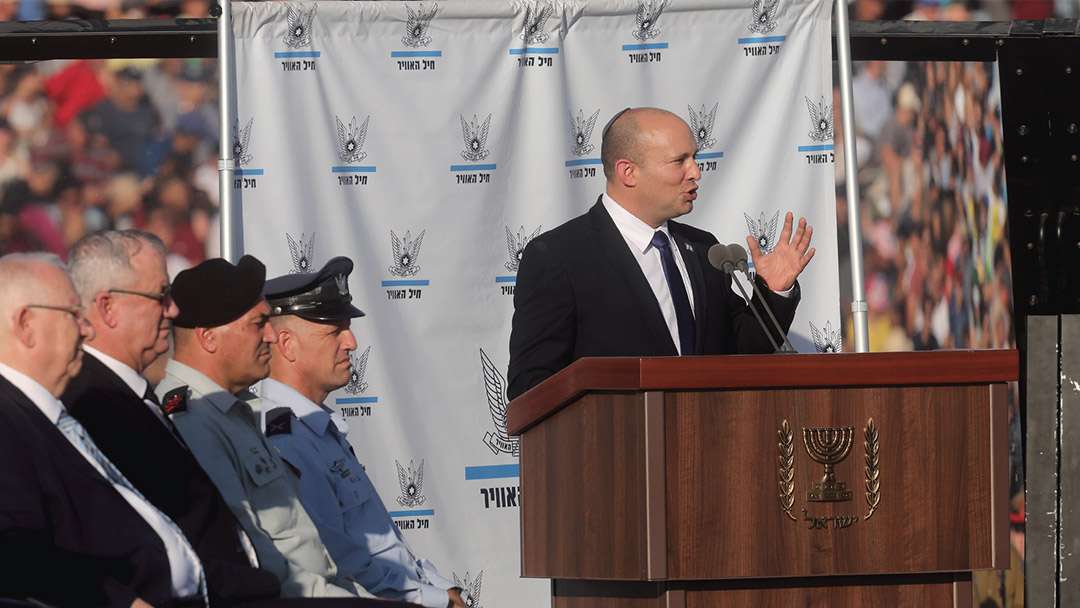Prime Minister Bennett has now been in office for three months and the sky has not fallen.
In fact what is remarkable is that in the macro, regarding many of the continuing challenges, the modalities for dealing with them also remain plus/minus the same. Other than in tone. Almost, but not entirely, regardless of who leads Israel.
Changes, when they occur, are mostly in style, but not substance.
The big issue for Bennett vis a vis the Palestinians, and a self-made one at that, has become his publically declared refusal to meet with Mahmoud Abbas.
Wanting to prop the Palestinian Authority up, but refusing to meet with its leader presents its own complexities.
No-one really thinks anything much can come from such a meeting, but has Bennett painted himself into a corner? Will he ultimately be able to resist the pressure to meet with Abbas?
Instead of outcomes or results, holding the meeting itself has now become the issue.
Generally, on the world stage Prime Minister Bennett and Foreign Minister Lapid are doing well.
Israel’s most critical relationship is with the United States. In the current times of a democratic president in the United States, the case can be made that an antagonistic relationship such as existed between Netanyahu and Obama is less beneficial than a friendly one.
Indeed, Bennett had a very successful visit to the United States.
Obama constantly criticised Netanyahu and his policies. However, in his meeting with Bennett, President Biden made little mention of the Palestinians or settlement building and Sheik Jarrah was relegated to its true level of overall relevance.
Importantly, one needs to remember that when it comes to this democratic president of the USA, Bennett has one very big advantage over Netanyahu.

Biden wants Bennett and this coalition to succeed—whereas Obama wanted Netanyahu to fail.
Obama openly wished for and sometimes worked towards toppling Netanyahu in his belief that any of the then successive opposition leaders such as Livni, Herzog et al would be more compliant with Obama’s world view.
On the other hand, Biden knows that if he is unsupportive of Bennett and his coalition and if it should fall apart, then he might have to deal with Netanyahu and an Israeli government more clearly made up of right wing parties, rather than an Israeli coalition constrained by its own makeup.
This week’s demonstration of the dangerous currents in dealing with the US was instructive.
The so called ‘Squad’ led by Alexandria Ocasio-Cortez, managed to have the additional support for Iron Dome of a billion dollars that had been promised by Biden, removed from a general budget related bill.
The ‘Squad’ scored a temporary but significant victory with worrying signs for the future. Especially about the yawning gap between the up and coming younger progressives in the Democratic Party versus the more centrist but much older and soon to depart, current leadership.
However, in a positive sign, the Democrats followed up almost immediately with another bill, solely on the aid for Israel, and which passed the House of Representatives by a vote of 420 to 9.
More widely Bennett and Lapid are also scoring other diplomatic advances, such as Bennett’s meeting with the very important Egyptian President al-Sisi in Egypt. The first such public meeting in a decade.
The meeting was held in a positive atmosphere and Egypt is key to many of Israel’s security and diplomatic issues.
Finance Minister Avigdor Lieberman is the most experienced politician in the coalition leadership.
He is also one of the toughest negotiators in the Knesset.
Lieberman has remained completely and uncharacteristically quiet on almost every issue and well away from the public eye.
The building and passage of the budget is his primary focus and the passing of the budget in November is critical to this government’s survival.
There are two more readings to go and much can happen, but so far Lieberman is proving to be the government’s most effective operator. Presumably he will demand something for this down the track.
Benny Gantz is the one coalition party leader who appears to not be afraid of acting independently. Or to put it another way, he is happy to place himself, quite deliberately, more outside of the coalition leadership consensus than anyone else.
Rumours abound of his poor personal relationship with Bennett and around some historical animosity between them.
Gantz also wants people to remember that he actually heads a party with more Knesset seats than Bennett.
Elements of Likud believe Gantz is the rifest for jumping ship and joining Likud in a possible government. Previous experience with Netanyahu may put the kibosh on this, but the fact that rumours keep resurfacing is in itself dangerous for the current government.
Overall, whilst there may not be great policy variations between Netanyahu and Bennett, there are big differences in style and approach.
Perhaps the most outstanding and well appreciated difference in these first 3 months is that Israel has a government which is now functioning. And in a more regular manner.
Not by way of radical policy changes, but simply by ministries returning to basic operational norms and dealing with their day to day issues.
This goes a long way to explaining why the Israeli population by and large is not dissatisfied with the new government.
In this case, a change in style has also proved to be one of substance.












0 Comments